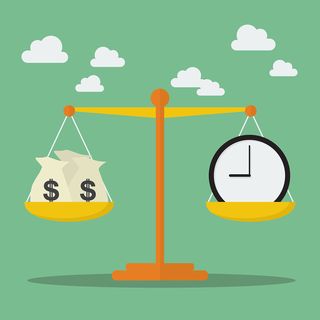I give a ton of presentations on veteransʼ benefits, to both attorneys and the public at large. The presentations range from 15 minutes to three days. Last week I presented at an independent living facility that requested the presentation be limited to 30 minutes, which included time for questions and answers. As I often do, I wondered, “How can I tell them all they need to know in that short amount of time?”
 It is about maximizing the time you have. This became very real for me when I was out of town on a business trip and I wanted to get a massage. I usually get a 90-minute full body massage, but the spa only had an opening for 30 minutes. I asked myself, “What is the point?” but I booked the appointment anyway. When I arrived, they handed me a picture of a person and asked me to circle the areas of concentration I desired. I circled my head, neck, shoulders, back, hands and feet (everything but my legs). To my surprise, the therapist did an amazing job, even though she didn't get to my hands and barely touched my feet. A quality massage in 30 minutes could be done!
It is about maximizing the time you have. This became very real for me when I was out of town on a business trip and I wanted to get a massage. I usually get a 90-minute full body massage, but the spa only had an opening for 30 minutes. I asked myself, “What is the point?” but I booked the appointment anyway. When I arrived, they handed me a picture of a person and asked me to circle the areas of concentration I desired. I circled my head, neck, shoulders, back, hands and feet (everything but my legs). To my surprise, the therapist did an amazing job, even though she didn't get to my hands and barely touched my feet. A quality massage in 30 minutes could be done!
And so can a quality presentation on VA benefits. The problem is that we want to give the audience the full treatment, leaving nothing unsaid. Instead, dissect the information like a body and circle the most critical areas on which to focus. Focus on those areas first; then, if you have extra time, you can add to the content. If you are short on time, cut out some of the minute details. Leave something for them to ask you or for you to share at a consultation.
After presenting easy-to-understand, complete information in 30 minutes, I had just as many people immediately request an appointment as I do when I speak for an hour. Since time is money, this begs the question: Do I need to speak for an hour? Do I need the 90-minute massage or is 30 minutes enough?
Refine your message, save time, and make more money.
If you have an hour of time on Wednesday, December 2nd at 12 EST, Dave and I will be sharing what we are currently doing in trust planning for VA benefits after the proposed look back takes place. Click here to register now. We'll talk about the transfer penalties for VA claimants expected to be implemented in February 2016. What does that mean for your trust drafting services? Will we need to change the language in our trusts? Or, worse yet, start using totally new trusts? Attend the upcoming VA Tech School Training on December 2nd at 12 EST on Drafting Trusts After the Laws Change.
Victoria L. Collier, Veteran of the United States Air Force, 1989-1995 and United States Army Reserves, 2001-2004. Victoria is a Certified Elder Law Attorney through the National Elder Law Foundation; Author of “47 Secret Veterans Benefits for Seniors”; Author of “Paying for Long Term Care: Financial Help for Wartime Veterans: The VA Aid & Attendance Benefit”; Founder of The Elder & Disability Law Firm of Victoria L. Collier, PC; Co-Founder of Lawyers with Purpose; and Co-Founder of Veterans Advocate Group of America.




